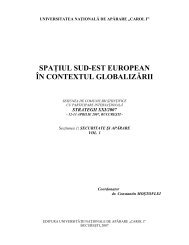PROVOCĂRI LA ADRESA SECURITĂŢII ŞI STRATEGIEI LA ÎNCEPUTUL SECOLULUI XXI
provocări la adresa securităţii şi strategiei la începutul secolului xxi
provocări la adresa securităţii şi strategiei la începutul secolului xxi
You also want an ePaper? Increase the reach of your titles
YUMPU automatically turns print PDFs into web optimized ePapers that Google loves.
in high level scientific exchanges, with the support, where appropriate, from<br />
INTAS.<br />
3. Relations between the European Union and Belarus<br />
Following Belarus’ independence in 1991, bilateral relations<br />
initially progressed well towards the adoption of a Partnership and<br />
Cooperation Agreement [13] (PCA, negotiated in 1995) and an interim trade<br />
agreement. Both agreements were, however, frozen as a result of the<br />
deterioration of the internal political situation in Belarus since 1962.<br />
The EU agreed the mentioned conclusions on the basis of the<br />
deteriorating political situation in September 1997. Ratification of the PCA<br />
and the interim trade agreement was suspended. Bilateral ministerial<br />
contacts would be established solely through the Presidency or the Troika.<br />
Technical assistance of the Community and MS would be halted, except for<br />
humanitarian or regional projects or for directly supporting the<br />
democratisation process.<br />
In 2001 the OSCE/ODIHR limited observation mission concluded<br />
that the presidential election failed to meet the OSCE commitments for<br />
democratic elections. A new attempt to improve bilateral relations by<br />
proposing a step-by-step process was developed in early 2002. This<br />
approach aims at clearly identified steps towards democratisation to be<br />
paralleled at each stage by gradual resumption of dialogue with the<br />
government and provision of broader assistance, ending with full<br />
normalisation of relations.<br />
Relations became worse during 2002 as the democratic progress<br />
remained absent. In support of the continuation of the OSCE activities in<br />
Belarus, 14 out of 15 EU Member States decided in November 2002 to<br />
prevent the entry into their territories of President Lukashenko and seven<br />
other political leaders of Belarus. The visa ban was lifted in April 2003 after<br />
the establishment of a new OSCE office in Minsk with a new mandate.<br />
In 2002-04 the EU has several times drawn attention in public to<br />
the lack of freedom of religious organisations, freedom of the media and<br />
freedom of expression and systematic repression of NGOs. A recent OSCE<br />
report confirms the negative trend by notably highlighting systematic<br />
pressure on the independent media outlets, NGOs and higher education<br />
institutions.<br />
The European Parliament, in its Resolution of 11 February 2003,<br />
called for moving towards a future partnership with Belarus, expressed<br />
strong concern at the increasing ‘self isolation’ of Belarus, and declared its<br />
support to the overall approach taken by the Commission and the Council.<br />
The resolution also underlined the need for the EU to develop a strategy<br />
within the European Neighbourhood Policy framework, to provide greater<br />
financial support to NGOs working to strengthen civil society and<br />
independent media, and to enhance cooperation in the field of Justice and<br />
Home Affairs.<br />
The Wider Europe/European Neighbourhood Policy concept<br />
(Commission Communication of 11 March 2003), which lays the ground for<br />
closer cooperation with the neighbouring countries of the enlarged Union,<br />
offers another opportunity for Belarus for improving relations with the EU.<br />
Belarus has welcomed the European Neighbourhood Policy concept and<br />
suggested specific areas for cooperation without, however, responding on<br />
the basic democratic requirements.<br />
The Commission has put forward a proposal on relations with<br />
Belarus in the context of European Neighbourhood Policy (ENP) strategy<br />
package of 12 May 2004. The ENP strategy paper states that under the<br />
present situation in the country - which by all accounts is deteriorating – it is<br />
not yet possible to offer the full benefits of the ENP to Belarus. The ENP<br />
should contribute to encouraging democratic reform in Belarus, notably<br />
through further support to civil society, support for democratic<br />
parliamentary elections in the Autumn 2004, and raising awareness of EU<br />
policies and assistance benefiting Belarusian citizens. Belarus is already<br />
eligible to participate in the Neighbourhood Programmes, and will be<br />
eligible under the new European Neighbourhood Instrument. The EU will<br />
further confirm the perspective of closer relations, including in the<br />
framework of the ENP, provided that fundamental reforms are carried out.<br />
It will also be possible to extend the full benefits of the ENP to<br />
Belarus when that country has established a democratic form of<br />
government, following free and fair elections; strengthened support for civil<br />
society in Belarus will help to build a more democratic, stable and<br />
prosperous country.<br />
III. Relations between the European Union and the countries of<br />
the Southern Caucasus<br />
1. Relations between the European Union and Armenia<br />
Based on the Partnership and Cooperation Agreement (PCA)<br />
entered into force on 1 July 1999, the EU's cooperation objectives are to<br />
build a relationship with Armenia in which the respect of democratic<br />
principles, the rule of law and human rights, as well as the consolidation of a<br />
market economy are fostered and supported.<br />
315<br />
316



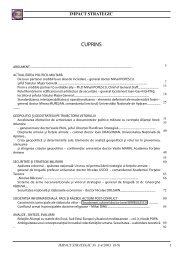

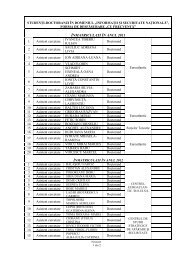
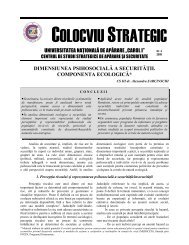
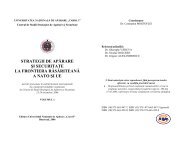
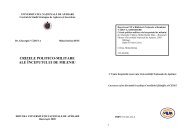



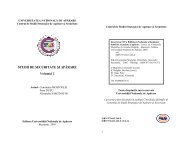
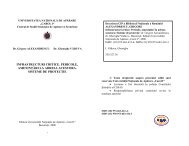
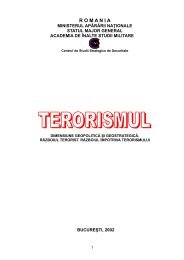

![„CAROL Nr 4 [29]/2008](https://img.yumpu.com/53801719/1/184x260/carol-nr-4-29-2008.jpg?quality=85)
